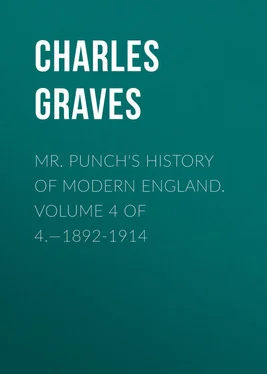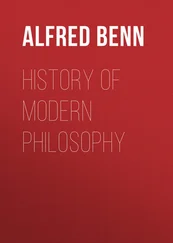Charles Graves - Mr. Punch's History of Modern England. Volume 4 of 4.—1892-1914
Здесь есть возможность читать онлайн «Charles Graves - Mr. Punch's History of Modern England. Volume 4 of 4.—1892-1914» — ознакомительный отрывок электронной книги совершенно бесплатно, а после прочтения отрывка купить полную версию. В некоторых случаях можно слушать аудио, скачать через торрент в формате fb2 и присутствует краткое содержание. ISBN: , Издательство: Иностранный паблик, Жанр: foreign_prose, foreign_humor, на английском языке. Описание произведения, (предисловие) а так же отзывы посетителей доступны на портале библиотеки ЛибКат.
- Название:Mr. Punch's History of Modern England. Volume 4 of 4.—1892-1914
- Автор:
- Издательство:Иностранный паблик
- Жанр:
- Год:неизвестен
- ISBN:http://www.gutenberg.org/ebooks/48405
- Рейтинг книги:5 / 5. Голосов: 1
-
Избранное:Добавить в избранное
- Отзывы:
-
Ваша оценка:
- 100
- 1
- 2
- 3
- 4
- 5
Mr. Punch's History of Modern England. Volume 4 of 4.—1892-1914: краткое содержание, описание и аннотация
Предлагаем к чтению аннотацию, описание, краткое содержание или предисловие (зависит от того, что написал сам автор книги «Mr. Punch's History of Modern England. Volume 4 of 4.—1892-1914»). Если вы не нашли необходимую информацию о книге — напишите в комментариях, мы постараемся отыскать её.
Mr. Punch's History of Modern England. Volume 4 of 4.—1892-1914 — читать онлайн ознакомительный отрывок
Ниже представлен текст книги, разбитый по страницам. Система сохранения места последней прочитанной страницы, позволяет с удобством читать онлайн бесплатно книгу «Mr. Punch's History of Modern England. Volume 4 of 4.—1892-1914», без необходимости каждый раз заново искать на чём Вы остановились. Поставьте закладку, и сможете в любой момент перейти на страницу, на которой закончили чтение.
Интервал:
Закладка:
The assassination of the Empress of Austria in September passed without mention in Punch , an omission probably accidental rather than deliberate, since she was popular in England as a great sportswoman. She was also a generous and enlightened patron of the arts, unconventional in her ways, blameless in her life, yet doomed by malign fate to the supreme infelicity of grandeur.
Gladstone and "C. – B."
Punch certainly missed a great opportunity for a chivalrous tribute to a lady whose unhappiness was greater than her rank, to say nothing of a text for a sermon on the notorious ineptitude of assassins in the choice of victims. Still, it was a harder theme than that which inspired Punch's most notable memorial verses in 1898 – the death of Mr. Gladstone. The writer contrasts his end with that of those who have died in their early prime or the ripeness of their manhood, and continues: —
But you, O veteran of a thousand fights,
Whose toil had long attained its perfect end —
Death calls you not as one that claims his rights,
But gently as a friend.
For though that matchless energy of mind
Was firm to front the menace of decay,
Your bodily strength on such a loss declined
As only Death could stay.
So then with you 'tis well, who after pain,
After long pain, have reached your rest at last;
But we – ah, when shall England mould again
This type of splendour past?
Noble in triumph, noble in defeat,
Leader of hopes that others held forlorn,
Strong in the faith that looks afar to meet
The flush of Freedom's morn.
And now, with all your armour laid aside,
Swift eloquence your sword, and, for your shield,
The indomitable courage that defied
The fortune of the field —
As in the noontide of your high command,
So in the final hour when darkness fell,
Submissive still to that untiring Hand
That orders all things well —
We bear you to your resting-place apart
Between the ranks where ancient foe and friend,
Kin by a common sorrow at the heart
Silent together bend.
A new leader of the Liberal Party emerged in 1899 in Sir Henry Campbell-Bannerman. Sir William Harcourt is shown wishing his successor joy – rather ironically – and Mr. Balfour, in the cartoon of "The Wrestlers," acknowledges the strength of his opponent after their first round. "C. – B.'s" promotion to leadership coincided with the discussion of the Tsar's disarmament proposals, which the Liberal leader was destined to revive later on, and in May, representatives of Great Britain attended the Hague Conference convened on the Tsar's initiative. The enthusiasm which Punch had displayed a generation earlier over the Paris Conference had now evaporated, and his contributions to the subject are marked by farcical scepticism. The Tsar and the Kaiser are shown in one picture holding, at some uncertain date in the future, an imaginary review of what remains of the Russian Army, the soldiers resembling Stigginses armed with umbrellas. Punch's twelve suggestions are a reductio ad absurdum of the Tsar's idea, the first being a proposal to postpone the coming into operation of the new rules for 1,000 years. The list of "Some Probable Agenda" for the Hague Conference, published when it was already sitting, is pure burlesque. For example: "Declarations of war shall in future be abolished as being calculated to wound the feelings of opponents." In the same number there is a large picture of Imperial Bruin drinking to Peace, coupling the toast with the name of Victoria, Empress of India (the Queen had just celebrated her eightieth birthday), with a batch of papers, labelled "Further demands in China," behind his back. The political atmosphere was not conducive to the calm discussion of international peace. Punch's espousal of the cause of Dreyfus became increasingly vehement and provocative. In May, under the heading " A bas la Vérité ," Truth is shown saying "I must get out" (of her well), while the French generals reply: "Not if we know it." A month later, in "At Last," Tenniel depicts indignant Justice triumphing with the Sword of Revision, and trampling Lies and Forgery under foot. The universal preoccupation with the topic is illustrated in Phil May's picture of the little street boy crying because his father "has got Drifus fever." In September, Napoleon's shade is shown scornfully surveying a group of degenerate generals eagerly discussing a "secret dossier", and saying, " Vive l'armée! Yes! But it was not with generals like you that I won my campaigns!" In the face of death Punch has always shown restraint, and, whether from ignorance or of set purpose, wrote of President Faure: —
He sought to serve his country's needs
And dying died with harness on.
But the address to France "in memory of the verdict of Rennes" amounts to an indictment of the whole nation: —
Who speaks of pardon? Nay, for France there's none,
Nor can be never till the damnèd blot
Be wiped away and expiation done.
Then, not till then,
May be renewed the bonds that once have been,
Since we, whatever else, are honest men.
Meanwhile, we know you not!
Go, hide your face until your heart is clean.
The Verdict of Rennes
Punch , it is true, spoke with a different voice on the same page, but it is doubtful whether his levity was calculated to heal the effect of his self-righteous indignation: —
To be observed by those who wish to testify their righteous indignation at the Rennes verdict by boycotting next year's Paris Exposition, and in the most material and convincing manner to bring about the complete rehabilitation of the unfortunate prisoner.
It is proposed —
That no more French leave shall be taken by individuals desirous of absenting themselves from their duties or annexing other persons' property. Undergraduates will faithfully attend every lecture, city clerks will bury no more aunts, cooks will cease to entertain policemen, and there will be a close time for burglary, kleptomania and kissing under the mistletoe.
That the use of French chalk shall be abandoned in ballrooms, and dancing given up altogether, except on village greens.
That "Frenchmen," alias red-legged partridges, shall be shot on sight, and given to the retriever to eat.
That elbow-grease shall be substituted for French polish.
That French beans shall be cut and given the cold shoulder at table.
That the French language (which at the present moment chiefly consists of the verb conspuer ) shall be tabooed, except in the case of solecisms like nom de plume , double entendre , à l'outrance , and so forth. Café , coupé and similar words shall be pronounced "caif," "coop," etc., as in Canada. Dépôt shall be "depott"; sang froid , au revoir , tableaux vivants and the like shall be similarly anglicized. Boulogne to be called "Boolong," if mentioned at all, which is inadvisable. No more bull-fights to be attended.
That French grey shall in future mean, as circumstances demand, either black or white.
Towards America Punch shows a tempered benevolence in his open letter to President McKinley, whom he warns against the new-fangled policy of Imperial expansion. His welcome to Mr. Choate, on his appointment as American Ambassador, is entirely cordial: "There are only two things necessary to make your visit a success. Don't believe all you hear, and read your Punch regularly." I do not know whether Mr. Choate took the second piece of advice or not; the first was quite unnecessary. He was a huge success as an Ambassador, though his chief claim on the abiding affection of England rests on his noble and self-sacrificing exertions, in extreme old age and up to the day of his death, in furthering the cause of the Allies and strengthening the brotherhood in arms of America and Great Britain.
Читать дальшеИнтервал:
Закладка:
Похожие книги на «Mr. Punch's History of Modern England. Volume 4 of 4.—1892-1914»
Представляем Вашему вниманию похожие книги на «Mr. Punch's History of Modern England. Volume 4 of 4.—1892-1914» списком для выбора. Мы отобрали схожую по названию и смыслу литературу в надежде предоставить читателям больше вариантов отыскать новые, интересные, ещё непрочитанные произведения.
Обсуждение, отзывы о книге «Mr. Punch's History of Modern England. Volume 4 of 4.—1892-1914» и просто собственные мнения читателей. Оставьте ваши комментарии, напишите, что Вы думаете о произведении, его смысле или главных героях. Укажите что конкретно понравилось, а что нет, и почему Вы так считаете.












